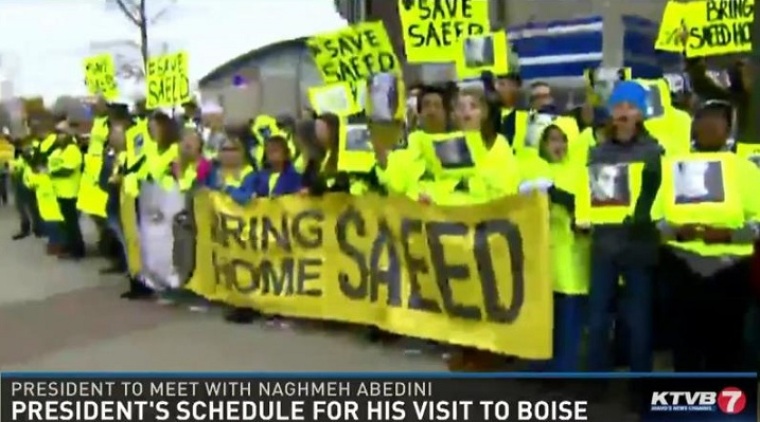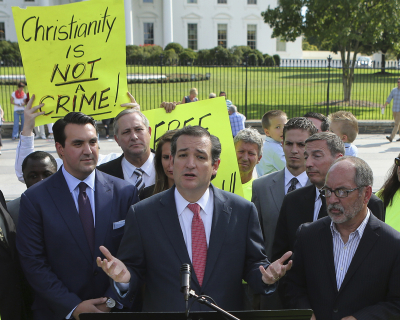President threatens veto of 'free Saeed' measures

WASHINGTON (Christian Examiner) – Several lawmakers, including Republican presidential candidate Marco Rubio, want to tie the release of American pastor Saeed Abedini from an Iranian jail to any nuclear deal with the country, but the White House has rejected the idea in the strongest possible terms.
Discussions about Abedini's release as a precondition to a deal started shortly after Sen. Bob Corker [R-TN] offered amendment to H.R. 1191, a bill called "The Protecting Volunteer Firefighters and Emergency Responders Act" April 23.
Critics have charged that Corker's amendment, in spite of its unanimous approval by the Senate Foreign Relations Committee, grants the president broader powers to negotiate with Iran and abdicates congressional oversight. But since the amendment was put forward, the legislation – a tax bill which originally had nothing to do with nuclear negotiations – has become the cart on which numerous senators are piling on.
More than 80 amendments now propose Iran's recognition of Israel's right to exist, "expedited consideration" of the terms of a nuclear deal, and rules on sanctions relief. All are compromises the White House has seemed willing to accept.
But when amendments were offered tying the approval of any deal with Iran to the release of Abedini and other Americans unlawfully detained by the foreign government, the White House bucked.
"The president would certainly veto any amendment or any bill with an amendment that undermined the unanimous compromise that was reached in the Senate Foreign Relations Committee or that interfered with the ongoing negotiations," White House Press Secretary Josh Earnest told reporters April 30. "Certainly, a provision, an amendment, that made this nuclear deal contingent on Iran's release of those three American citizens would fall, I think frankly, into both categories."
Earnest was specifically referencing the amendments offered by Sen. Marco Rubio [R-FL] and James Risch [R-ID].
Rubio introduced an amendment which said no deal with Iran could be concluded unless "all United States citizens unjustly detained by Iran, including Jason Rezaian, Amir Hekmati, and Saeed Abedini, have been released from Iranian custody, and Government of Iran is fully cooperating in efforts to locate Robert Levison." Levison, a retired FBI and DEA agent, has been missing in Iran since March 2007.
Risch, whose amendment reads much the same as Rubio's, is also the driving force behind Senate Concurrent Resolution 14. That resolution, introduced April 30, says "the President may not provide sanctions relief to Iran until certain United States citizens are released." Abedini, who is from Idaho, is among those named in the resolution.
The efforts by Rubio and Risch are not the first congressional attempts to encourage the White House to work to free Abedini and the other Americans. However, most other attempts in Congress have been in the form of resolutions.

In February, Rep. Robert Pettinger [R-NC-9] introduced House Resolution 111 calling on Iran to release Abedini immediately. And in March, Rep. Diane Black [R-TN-6] called for a resolution condemning violence against religious minorities in the Middle East.
Black's resolution, which has since been referred to the House Subcommittee on the Middle East, claimed "a 2014 United Nations report found that the Iranian government continues to arrest and imprison Christians, Baha'is, Zoroastrians, and other religious minorities simply because of their faith, including pastor Saeed Abedini, an American citizen who was imprisoned in 2012 for alleged crimes related to his Christian faith."
Sen. James Inhofe [R-Oklahoma] also sponsored a Senate resolution in February. Under the guise of protecting religious minority rights and freedoms worldwide, Inhofe's resolution referenced Abedini's arrest, conviction and sentence to "eight years in a brutal Iranian prison where he remains today."
Inhofe's resolution was referred to the Senate Foreign Relations, which Corker leads, and has remained there unattended since.
Even if passed, resolutions do not carry the force of law and are generally regarded by presidents as an expression of the House or Senate chamber's opinion. It is for that reason that Rubio and others wanted to make Iran's release of Abedini and the others a precondition to a nuclear agreement.
Sen. Ted Cruz [R-Texas], who has asked Congress to shelve the Corker bill and fulfill its role of congressional oversight, said the proposed deal with Iran would only embolden the nation to seek nuclear weapons and attack Israel. But he also said the deal would directly threaten the lives of Americans like Abedini.
"There is no topic more serious this body could consider than preventing the murder of Americans," Cruz said in the Senate chambers May 6. "The Iranians' behavior speaks for itself. They are, right now today, unlawfully imprisoning multiple American citizens--Pastor Saeed Abedini, Amir Hekmati, as well as Jason Rezaian--under brutal conditions. They are withholding information on the whereabouts of Robert Levinson."
Saeed has been in Iranian custody since he went to Iran to assist in the building of an orphanage in 2012. He was charged with preaching against Islam and promoting Christianity.